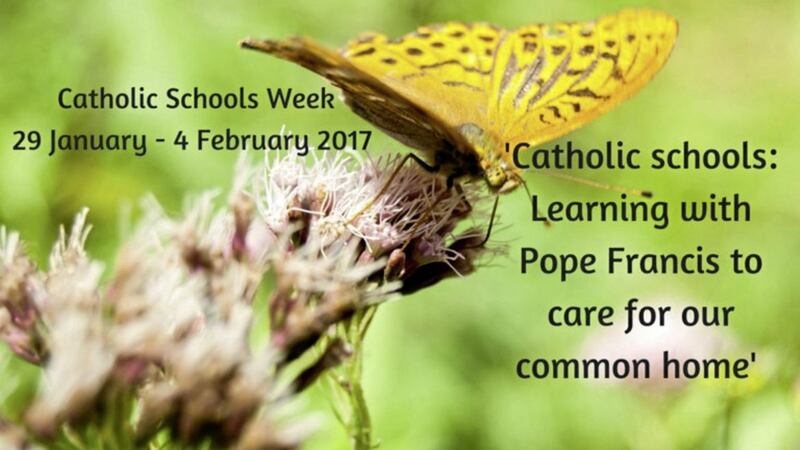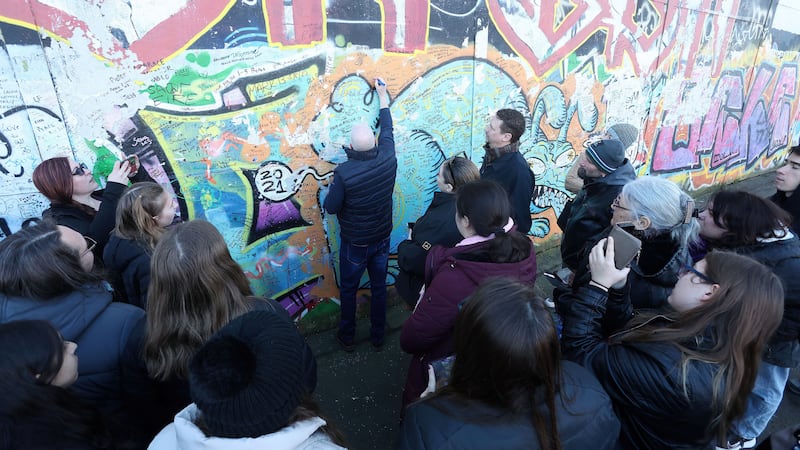CATHOLIC Schools Week, which begins on Sunday, is the annual celebration of Catholic schools throughout Ireland which marks and acknowledges the contribution that the family of Catholic schools make to Irish society, the wider world and the mission of the Church.
The week is designed to be a lively celebration for all who have a stake in our schools - students, staff, families, priests, and parishioners - and an opportunity to reflect on the distinctive character of Catholic schools and their contribution to the common good.
Schools (both primary and post-primary) typically observe this annual celebration though special liturgies and prayer services, school and parish activities and opportunities for Catholic schools to share the good news of Catholic education with the wider community.
The theme this year is Catholic Schools: Learning with Pope Francis to Care for Our Common Home. It is centred on Pope Francis' 2015 encyclical letter Laudatio Si (Praise be to You) and it has the subtitle On Care for Our Common Home. Laudatio Si is a most prophetic and extremely challenging work which asks all of us to look at the harm and destruction that humankind has caused on this wonderful planet and calls on each of us to make the necessary changes in our lifestyles (individually and collectively) to protect our common home and to ensure that future generations can live, prosper and enjoy this creation of God.
In Laudatio Si, Pope Francis pointedly outlines the many environmental 'sins' of a society which recklessly and endlessly pursues wealth, power and consumption of the world's many but finite resources, These include climate change, drought, loss of biodiversity and the decline in the quality of human living, health and relationships. We have indeed inflicted great damage on our world and done it shamefully, as Pope Francis points out: "The Earth, our home, is beginning to look more and more like an immense pile of filth. In many parts of the planet, the elderly lament that once beautiful landscapes are now covered with rubbish."
Pope Francis places all discussion about the destruction of the environment firmly in the context of social justice. This is no abstract or even ecological debate but one that has at its very essence the deepest concern for the poor and the marginalised. It is the plight of the countless of hundreds of millions who live in the margins of society and in the margins of the conscience of the affluent and powerful who Pope Francis urges us to address. Pope Francis points out that we are not facing two separate and unrelated crises - one social and the other environmental. They are inextricably linked. We all suffer from the effects of environmental destruction and climate change - but not equally. It is the poor who are the most vulnerable to the effects of this human-created destruction of our world and the depletion of its resources.
Our 'throw-away culture' creates atmospheric pollutions that cause millions of premature deaths, especially among the poor. Environmental degradation and climate change destroys the means of subsistence of entire communities in the developing world who are largely dependent on natural reserves and ecosystemic services such as agriculture, fishing and forestry - and leads to the tragic rise in those who are fleeing poverty as a result of this environmental degradation. Even the quantity and quality of available clean water is diminishing as pollution and the misuse of this life-giving resource is turned into yet another commodity to be given only to those who can afford it. And, of course, with drought comes famine, disease and more human misery.
This year, during Catholic Schools Week, all pupils in Catholic schools throughout Ireland will have opportunities to explore this crucial issue which affects everyone living today and for future generations. The resources provided by the Irish Catholic Bishops' Conference in support of Catholic Schools Week are outstanding and exciting for student and teacher alike. They will engage, enrich and challenge all members of our school community. They will also provide parents and other members of the community to reflect on our environment and our responsibility to care for the world and our brothers and sisters.
Catholic Schools Week 2017 is not simply about providing opportunities for our young people to learn about the world; it encourages them - and all of us - to become advocates for justice, to become the voice of the voiceless, to be the change that will ensure that the wonderful resource that God has given us will serve all of us as is His will.
:: Dr Aidan Donaldson is a member of the Down and Connor Catholic Schools' Support Service team and Director of the Edmund Rice Network charity Project Zambia.








